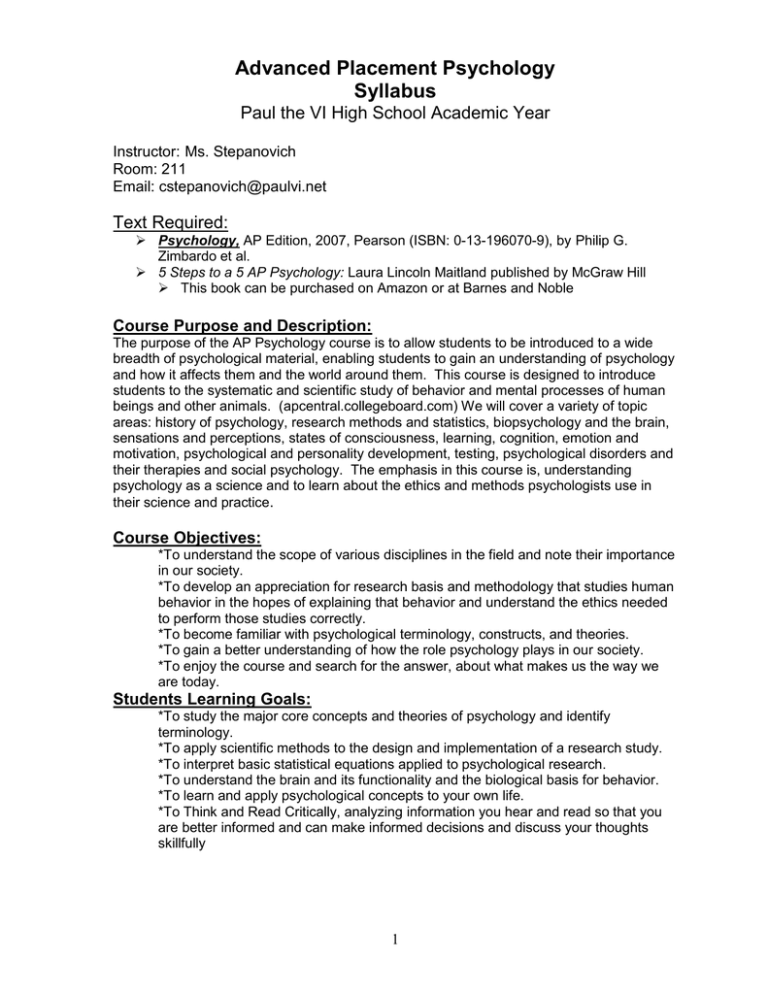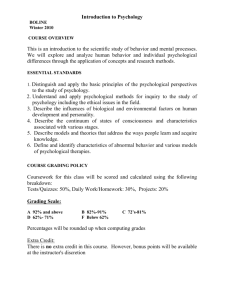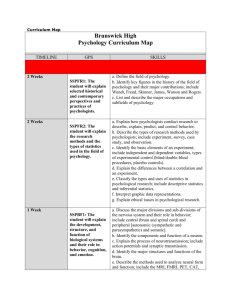Advanced Placement Psychology
advertisement

Advanced Placement Psychology Syllabus Paul the VI High School Academic Year Instructor: Ms. Stepanovich Room: 211 Email: cstepanovich@paulvi.net Text Required: Psychology, AP Edition, 2007, Pearson (ISBN: 0-13-196070-9), by Philip G. Zimbardo et al. 5 Steps to a 5 AP Psychology: Laura Lincoln Maitland published by McGraw Hill This book can be purchased on Amazon or at Barnes and Noble Course Purpose and Description: The purpose of the AP Psychology course is to allow students to be introduced to a wide breadth of psychological material, enabling students to gain an understanding of psychology and how it affects them and the world around them. This course is designed to introduce students to the systematic and scientific study of behavior and mental processes of human beings and other animals. (apcentral.collegeboard.com) We will cover a variety of topic areas: history of psychology, research methods and statistics, biopsychology and the brain, sensations and perceptions, states of consciousness, learning, cognition, emotion and motivation, psychological and personality development, testing, psychological disorders and their therapies and social psychology. The emphasis in this course is, understanding psychology as a science and to learn about the ethics and methods psychologists use in their science and practice. Course Objectives: *To understand the scope of various disciplines in the field and note their importance in our society. *To develop an appreciation for research basis and methodology that studies human behavior in the hopes of explaining that behavior and understand the ethics needed to perform those studies correctly. *To become familiar with psychological terminology, constructs, and theories. *To gain a better understanding of how the role psychology plays in our society. *To enjoy the course and search for the answer, about what makes us the way we are today. Students Learning Goals: *To study the major core concepts and theories of psychology and identify terminology. *To apply scientific methods to the design and implementation of a research study. *To interpret basic statistical equations applied to psychological research. *To understand the brain and its functionality and the biological basis for behavior. *To learn and apply psychological concepts to your own life. *To Think and Read Critically, analyzing information you hear and read so that you are better informed and can make informed decisions and discuss your thoughts skillfully 1 Course Curriculum: This course outline, from the AP Psychology Course Description, shows the major content areas covered in the AP Exam, as well as the approximate percentage of the exam that is devoted to each area. The outline is a basic guide. It is not intended as an all-inclusive list of topics and will not be used as such. I. Methods, Approaches, and History (2 Weeks) 7-9% A. Logic, Philosophy, and the History of Science B. Approaches 1. Biological 2. Behavior 3. Cognitive 4. Humanistic 5. Psychodynamic C. Experimental, Correlational, and Clinical Research D. Statistics 1. Descriptive 2. Inferential E. Ethics in Research II. Biological Bases of Behavior (2 Weeks)8-10% A. Physiological Techniques B. Neuroanatomy C. Functional Organization of the Nervous System D. Neural Transmission E. Endocrine System and Genetics III. Sensation and Perception (2 weeks) 7-9% A. Thresholds B. Sensory Mechanisms C. Receptor Processes D. Sensory Adaptation E. Attention F. Perceptual Processes IV. States of Consciousness (1 Week) 2-4% A. Sleep and Dreaming B. Hypnosis C. Psychoactive Drug Effects V. Learning (2 weeks) 7-9% A. Heredity-Environment Issues A. Biological Factors B. Classical Conditioning C. Operant Conditioning D. Cognitive Processes in Learning VI. Cognition (2 weeks) 7-9% A. Memory B. Language C. Thinking D. Problem Solving and Creativity 2 VII. Motivation and Emotion (2 Weeks) 7-9% A. Biological Bases B. Theories of Motivation C. Hunger, Thirst, Pain D. Social Motives E. Theories of Emotion VIII. Developmental Psychology (2-3 Weeks) 7-9% A. Life Span Approach B. Research Methods 1. Longitudinal 2. Cross-sectional C. Developmental Theories D. Dimensions of Development 1. Physical, Cognitive, Social, and Moral E. Gender Roles and Gender Differences IX. Testing and Individual Differences (1 Week) 5-7% A. Standardization and Norms B. Reliability and Validity C. Types of Tests D. Ethics and Standards in Testing E. Intelligence F. Heredity/Environment and Testing G. Human Diversity X. Personality (2 Weeks) 7-9% A. Personality Theories and Approaches B. Assessment Techniques C. Self-concept, self-esteem D. Growth and Adjustment E. Conflict XI. Abnormal Psychology (2-3 weeks, including Treatments) 7-9% A. Definitions of Abnormality B. Theories of Psychopathology C. Diagnosis of Psychopathology D. Anxiety Disorders E. Somatoform Disorders F. Mood Disorders G. Schizophrenic Disorders H. Organic Disorders I. Personality Disorders XII. Treatment of Psychological Disorders (6-8%) A. Treatment Approaches 1. Insight Therapies: Psychodynamic Approach 2. Behavioral Approaches 3. Cognitive Approaches 4. Biological Approaches B. Modes of Therapy (e.g. individual, group) C. Community and Preventative Approaches 3 XIII. Social Psychology (2-3 Weeks) 7-9% A. Group Dynamics B. Attribution Process C. Interpersonal Perception D. Conformity, Compliance, and Obedience E. Attitude and Attitude Change F. Organizational Behavior G. Aggression/Antisocial 4 Classroom Policies To be successful in this class, students must assume great responsibility for their own learning. The students will be responsible for all of the material in the textbook regardless whether it was covered in class or not. It is absolutely imperative that students read for understanding and complete all assignments in order to be successful. Break Down of Grading: Tests 40% Projects (1 a quarter) 25% Quizzes 20% Homework/Classwork/Participation 15% Turning in Work: There will be a bin marked for your class and it is YOUR responsibility to deposit your work into the correct bin at the BEGINNING of class. I will not take time to collect work as we have a lot to cover. Late Work: All assignments are expected to be turned in on the designated due date. Work that is not turned in during student’s assigned class period and to their assigned bin is automatically late. Students who do not have the assigned homework on the assigned day will fall subject to this policy: Homework will only be accepted on the day it is DUE. Furthermore, to receive credit for your completed work, it must be in class during your period. o If it is in your locker, turn it in by the end of the day to receive the highest grade of an 89%. o Your homework must be a hardcopy unless otherwise noted by me. Late homework will be accepted only ONE day past its due date; it will automatically be a 50%. All “Study Guides” are required to be handwritten, unless other wise noted. Late Projects All assignments are expected to be turned in on the designated due date. If your project is not submitted on the assigned day, you will fall to the following consequences. 5 You have 2 Days to turn in missing assignment with a letter grade off for each day. After the two-day limit the assignment will not be accepted and will be given a zero. (Drop days due not count) o Example: Project is not turned in on the due date, student cannot receive an A. If it is turned in on the next class period, student will receive a B (89%). If it turned in on the 3rd class period, student will receive a C (79%). Absent: Students who are absent must first check the silver bin to collect any work they missed THEN speak directly to me to address what assignments they missed. This is the student’s responsibility. I will not chase you down to give you your missing work. Makeup Assessments: If you are absent on the day of a test or quiz, you are allowed to take the test before or after school, or doing a study hall period. Students who are absent on an assessment day fall to these policies: o I expect, unless otherwise notified by the student, that you will be present the next morning at 7AM to complete the missed assessment. If there is no e-mail telling me otherwise, I assume that you are back in school. If you miss your makeup, you will start off -10 points. You will continue to lose 10 points every day you do not show up or contact me. Please note: I always announce tests in advance, so even if you happen to be absent on the day before a test, you are still expected to take the test on the day of the test. It is your responsibility to make up work in a timely manner so as not to receive a zero. I will NOT chase you down. *Students who collect a pattern of missing test days (1 or more) will be given a makeup test in the form of an essay. “Life Happened” Pass Each student will be granted one “Life Happened Pass”. If you are missing an assignment or homework, you may use this pass to receive no late penalty for THAT DAY ONLY. After you have used the pass, it may not be used again. You are to sign the pass and turn it in DIRECTLY to me. o If you lose your pass, you will not be given another one. Required Materials for Class: - A binder (at least 3 inches) - Paper for the binder (must always have extra) - Dividers (14) for each chapter we will cover - Writing utensils - Five Steps to Five- AP Psychology (most recent edition) Students are expected to bring their textbook, binder, and a pen or pencil to each class period. 6 Cheating: -Any form of cheating on any assignment (homework, papers, projects, quizzes, test, etc). WILLNOT be tolerated. -You will be sent directly to Administration and dealt with by the Academic Counsel. -You will receive a zero for the assignment. 7



